Okay, Let’s Fix Comedy In Games – The V-Effekt
by Edward
 Hi, I’m Edward Price. I’m a twenty-four year old graduate. I have a degree in English and Drama. I’m writing a sitcom with my friend and it may never see the light of day. And if there’s one thing that I hate, it’s the state of comedy in gaming.
Hi, I’m Edward Price. I’m a twenty-four year old graduate. I have a degree in English and Drama. I’m writing a sitcom with my friend and it may never see the light of day. And if there’s one thing that I hate, it’s the state of comedy in gaming.
That sounds like a feeble justification for what I’m about to write, but the truth is, it’s not. I don’t have any real authority on how things should be written but, for the most part, games aren’t funny. I want to help fix that. I recognise that there’s no direct formula and, if anything, interviews I’ve had with writers in the past suggest that creating something that people will laugh at is more than a little difficult, with a multitude of factors which could cause the joke to fall flat at any moment.
Over the years, I’ve noticed the emergence of one specific type of joke that occurs time and again, but I don’t think I can name you a single occasion where it’s been funny. So if we’re going to start off anywhere, it should be with this: Do not, under any circumstances, point out an annoying thing that games do and then go on to do it yourself. When you say it out loud, it sounds so simple that it seems incomprehensible that anyone would do it, let alone the degree to which it’s been abused these last few years. I’ve lost count of how many times I’ve winced as whatever I’m playing turns to the audience, then breaks the fourth wall along with any immediate hopes I once had of enjoying the next hour of gameplay.
Imagine you’re out somewhere with friends and you’re introduced to someone whom you’ve never met before. Conversation starts off a little slow at first, but then it gains momentum and you feel like you’ve got a good handle on their personality. Something happens. Without prompting, they turn and ask you if you remember that person you hate; that thing they always used to do that drove you up the wall. You hesitantly nod your head, which prompts them to do an impression.
 You don’t laugh or encourage it further, only betraying a glint of familiarity, yet, despite this, they don’t stop. For the next half an hour, you’re mentally stuck at an impasse as you’re no longer being invited to judge this stranger on their merits, but to applaud them as they attempt to poke fun at someone you’d rather forget, and with an over-familiarity which fills you with an unease that you still can’t quite shake off after you’ve stumbled home, thrown the keys aside, and crumbled head-first onto the nearest pillow.
You don’t laugh or encourage it further, only betraying a glint of familiarity, yet, despite this, they don’t stop. For the next half an hour, you’re mentally stuck at an impasse as you’re no longer being invited to judge this stranger on their merits, but to applaud them as they attempt to poke fun at someone you’d rather forget, and with an over-familiarity which fills you with an unease that you still can’t quite shake off after you’ve stumbled home, thrown the keys aside, and crumbled head-first onto the nearest pillow.
In that scenario you could have asked them to stop their imitation at any point. If they refused, you’d have the option of leaving or simply talking to someone else, but when you’ve paid money for the privilege and you can’t progress further, then it’s a different situation.
Acknowledging the fourth wall is always a difficult prospect, because in doing so you’re creating a sense of self-awareness which – despite it often being for a fleeting moment – will always colour the rest of the entire experience. There’s a reason that Bertolt Brecht used to employ it as part of his verfremdungseffekt (or “V-Effekt”, if you’re not a Drama graduate, or pretentious); his style of theatre was always about causing alienation between the play at hand and the audience watching it. There’s little else that’s more alienating than dropping the entire façade, admitting it’s all a ruse, then continuing as if nothing’s happened.
For the most part, whoever utilises it tends to do so in order to point out their own shortcomings, then neglects to fix those issues. In a comedy, this can be forgivable because the moment can be as short as a few seconds. In games, however, it’s worse because it can be as long as an hour. It’s often worse than that; if they’re calling out a flaw elsewhere in the industry, they’re actively choosing to spend countless hours recreating something bad with a view to making people play through it.
It’s almost certainly a hang-up from a brief stint where I worked in television, but whenever I see a terrible moment in a show, or play through an awful segment of a videogame, I always envision a bunch of people meeting around a table discussing that particular content during its inception. The twist is that in my head everyone is willingly treating it like the terrible idea it is, but everyone is incredibly enthusiastic about putting it in and delightedly pointing out the reasons why its inclusion would be so maligned. The way I interpret it is that if it’s present, then everyone working on it had no issues with its implementation, or it simply wouldn’t exist in the form it does.
In my mind, everyone involved has to consciously approve the idea then go out of their way to make the end experience worse for the player in order to make a joke that they (almost certainly) won’t find funny. This is where the V-Effekt makes a return. By addressing a shortcoming and never making any effort to address it, the player is taken out of the immersion and, rather than laughing, they draw their attention to flaws elsewhere. Therein lies the death knell; you’re not just falling flat with your joke, you’re inviting the player to become more critical about your product.
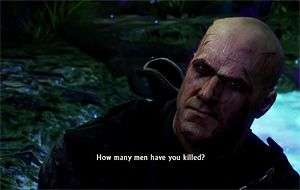 Take the Uncharted series, for example, although be aware that the following paragraphs contains spoilers. The first two were slightly lacklustre third-person shooters with unrefined mechanics, floaty controls, QTEs that felt oddly implemented, and ridiculous boss battles that felt more like Herculean slogs than climactic affairs. However, the second instalment – Among Thieves – ruined its own ending by having the villain ask the protagonist how many people he’d killed to get to him, to which the smarmy lead responded by not killing him, apparently exonerating our hero for the minor genocide he’d committed before the credits rolled.
Take the Uncharted series, for example, although be aware that the following paragraphs contains spoilers. The first two were slightly lacklustre third-person shooters with unrefined mechanics, floaty controls, QTEs that felt oddly implemented, and ridiculous boss battles that felt more like Herculean slogs than climactic affairs. However, the second instalment – Among Thieves – ruined its own ending by having the villain ask the protagonist how many people he’d killed to get to him, to which the smarmy lead responded by not killing him, apparently exonerating our hero for the minor genocide he’d committed before the credits rolled.
Its follow-up – Drake’s Deception – was even worse. In the first few hours Lord Smuggington quips “I hate climbing”, as the player once again prepares to climb something for what would have been the three-hundredth time he’s had to do it in the series thus far. My response as a player isn’t to laugh, wish I could tussle his hair, and call him a lovable scamp, but instead ask “why are you still making me do this, then?” After making that hilarious meta-comment, why do I still have to spend half of my time climbing until the credits roll? Instead of changing the formula or exorcising the segments and replacing them with something else, why would you turn to the audience, acknowledge that half of your game is overdone, and then proceed to do absolutely nothing about it for the next twelve hours?
Similarly, Nathan ‘Genocide’ Drake later finds himself in one of many set-pieces that see him trying to escape from a burning or exploding building, or monument, or whatever Naughty Dog decided to blow up next, only for him to prove yet again that his mouth is somehow his deadliest weapon. Suddenly, a group of henchmen burst onto the scene and start firing. Instead of surrendering and asking to be taken to a tribunal for war crimes, our mass-murdering friend repeatedly ponders why they’re trying to kill him instead of escaping from otherwise certain death.
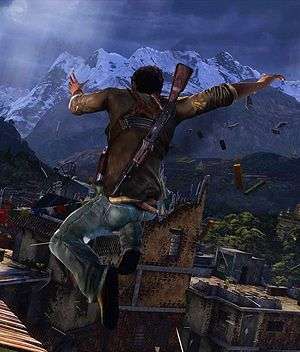 Once again, thoughts move from “well, at least I’m not climbing stuff” to “hold on, why am I having another gunfight in such a preposterous scenario? And why is it so frustrating?” It doesn’t make me laugh; it makes me feel like you have such contempt for your audience that you’d force them to pay through the nose for your product, then deliberately poke fun at them for making them suffer through something you knowingly shoe-horned in. That’s not funny; that’s spiteful.
Once again, thoughts move from “well, at least I’m not climbing stuff” to “hold on, why am I having another gunfight in such a preposterous scenario? And why is it so frustrating?” It doesn’t make me laugh; it makes me feel like you have such contempt for your audience that you’d force them to pay through the nose for your product, then deliberately poke fun at them for making them suffer through something you knowingly shoe-horned in. That’s not funny; that’s spiteful.
Worse yet, it opens your product up to far greater scrutiny. Suddenly, I’m noticing how unresponsive the controls are at key junctures, the fact that the trigger buttons aren’t actually used to fire guns, and how some enemies can survive multiple head-shots for no reason. I’m no longer just questioning what Nathan’s quipping about; I’m subconsciously pulling at every thread I can for inconsistencies. Your smug need to intentionally expose and never address your own flaws unintentionally turns your average game into a bad one.
Take, for example, every game that’s ever moaned about escort missions and then forced you to do them. Somewhere there’s a whole team of people who dedicated weeks, perhaps even months, of their lives just to make an obligatory stealth section, escort mission, or race, so that the entire studio as a whole could decry them. Part of me wonders if it’s too cynical to suggest that these moments are born from executives demanding they exist, and the terrible attempts at humour that arise are them rebelling in the weakest way possible, but then I realise the alternatives and get just a little more depressed about the whole thing.
Even Saints Row IV – the funniest AAA title in recent memory, or perhaps ever – doesn’t get away with it; if I hadn’t willingly gone out of my way to do every side-quest and distraction because I had a dub-step gun with infinite ammo, I’d have been spitting blood when the final chapter arrived and someone forced me to complete some auxiliary tasks with the faint justification of “we’re stretching out gameplay!“.
Far Cry 3: Blood Dragon goes so far with its nudging and winking that it veers from “trying too hard” to “annoying“, and eventually to “it’s like that Monty Python sketch where Eric Idle keeps shouting ‘say no more, say no more‘, only it’s real and I want to die” within about ten minutes of starting, thanks to its ridiculous tutorial sequence. Having a prompt telling the player to press a button if they hate tutorials isn’t funny if you then force them to go through a tutorial for the next couple of minutes, then non-ironically bring up further tutorials down the road.
The most recent and heartbreaking example I can think of is South Park: The Stick of Truth. Trey Parker and Matt Stone are comic idols to me, and I’ve near-unconditionally adored everything they’ve done, even their lesser known works like That’s My Bush! or Cannibal! The Musical!, so I was eager to see what they’d do with a medium they’ve never previously touched – they’d shopped out the license early on, but never directly involved themselves in the process until now. At first it was everything I’d dreamed of in a South Park videogame, but it turned out that even Parker and Stone can’t resist this kind of joke themselves.
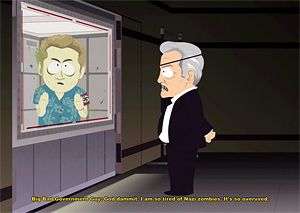 So it was that I found myself mouth agape as a character complained about a recent plot development with “I hate this; it’s so overdone“, only to then focus the remaining action around it for the final two thirds of the story. Subversions are apparently attempted later on, but it’s hard to notice them when they’re framed under the guise of an overused plot device that’s still being used because…? Considering the absolute wealth of tropes and clichés they could have tackled and skewered in a manner you’d expect from the creators of one of the most controversial cartoons on TV, it was a bit of a let down to see them take that one idea and relentlessly run it so far into the ground that it was practically assaulting crab people.
So it was that I found myself mouth agape as a character complained about a recent plot development with “I hate this; it’s so overdone“, only to then focus the remaining action around it for the final two thirds of the story. Subversions are apparently attempted later on, but it’s hard to notice them when they’re framed under the guise of an overused plot device that’s still being used because…? Considering the absolute wealth of tropes and clichés they could have tackled and skewered in a manner you’d expect from the creators of one of the most controversial cartoons on TV, it was a bit of a let down to see them take that one idea and relentlessly run it so far into the ground that it was practically assaulting crab people.
The only example outside of point-and-clicks I can think of that didn’t infuriate me to my core was probably in Eat Lead: The Return of Matt Hazard; after decrying how lazy games designers are when they repeatedly utilise warehouse levels, the action then proceeded to sprawl across four of five near-identical locations by the end credits. It was definitely a bit lame, but to rally on this seems a bit mean-spirited as it was a title with plenty of promise and far more variety than most shooters, but which couldn’t realise its full potential thanks to its clear lack of budget.
However, that lack of budget isn’t an affliction that can be fairly attributed to the other examples on this list, and that’s possibly where some of my ire also lies with this issue; if Naughty Dog, Ubisoft et al wanted to fix problems instead of pointing them out, phrasing it as a joke, and hoping everyone thinks of them as such, they could easily have done so. Well-timed self deprecation can be an effective comic tool, but it’s one which so many games seem content on utilising before making the player do the exact thing they’re joking about, in the hopes that it somehow justifies their actions. The problem is that if you make too many jokes about yourself, or start launching them at the wrong time, nobody’s going to laugh and you’re going to start losing friends because you’re content to point out your flaws and do nothing about them. I just hope the industry learns to stop doing it before it’s too late.
Last five articles by Edward
- Best of 2015: Journey's End: A New Beginning
- Journey's End: A New Beginning
- You Can't Choose Your Happy Ending
- Okay, Let's Fix Comedy In Games - The V-Effekt
- Time Keeps On Smashing Away














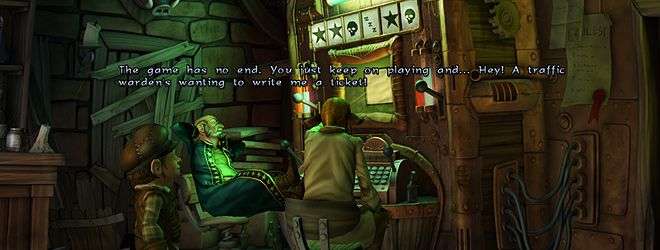
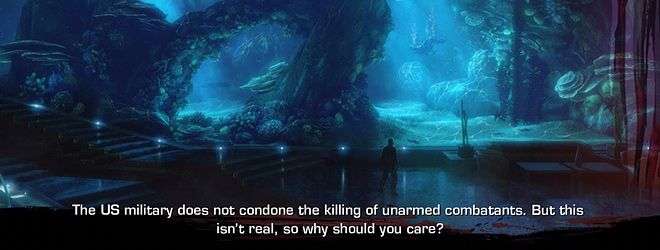

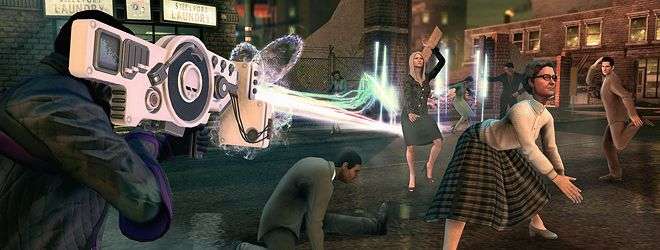





Fourth wall kicking can work if handled well, but, as you say, runs the very real risk of borking the fucking game/show/book. I think it is perhaps seen as a cool/funny thing to do, but handled clumsily it just shatters immersion. To then go on and make something a staple of the same show/game/book is just stupid. Perhaps, as you say, the jokes pointing it out are an embarrassed reference to some gameplay cliche that the majority didn’t want in there.
Also, whenever I get a press release that talks about a game being full of ‘pop culture references and humour’ I shudder. And, nine times out of ten, close the email.